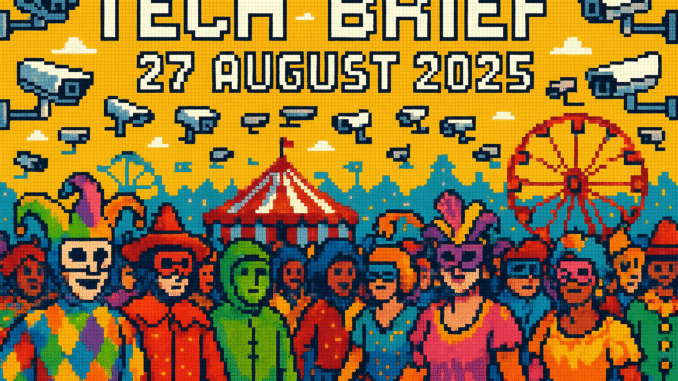
Tech Brief 27 August 2025 dives straight into today’s most urgent tech stories, from facial recognition at Notting Hill Carnival to new debates over AI rights. If you missed yesterday’s Tech Brief, you can catch up here before reading on.
Met Police Use Facial Recognition for Arrest at Notting Hill Carnival
“I saw more cameras than costumes,” said one Carnival attendee. The Met Police have confirmed that live facial recognition technology scanned thousands of faces at this year’s event, reportedly leading to a “groundbreaking” arrest. It is the first time this technology has been used so widely at Notting Hill Carnival.
The Carnival is famous for its music, colour, and community energy. Now, it also hosts advanced crowd surveillance. Critics have been vocal about the bias present in facial recognition, which has struggled with accuracy, especially for people of colour. Privacy campaigners say this move risks overshadowing the long legacy of public celebration that Carnival represents.
For anyone who remembers the 90s, it’s hard not to hear echoes of cyberpunk stories about database fear and surveillance culture. The tension between security and communal space is no longer just a niche concern; it now shapes the reality of every large public gathering.
TUC Urges Government to Crack Down on AI Shortcuts in Business
Fact: The Trades Union Congress has formally called on the government to regulate how British businesses use AI to cut corners. Their concern is clear. AI is being rolled out to boost profits, but workers are left trailing behind.
Union leaders argue that the rush for automation is not just about efficiency. It is creating a two-tier workforce where some jobs vanish and others stagnate. Sceptics are raising uncomfortable questions about skill redundancy, workplace fairness, and the kind of “digital Taylorism” last seen with the introduction of early office automation packages in the 90s.
The implications are immediate for anyone in frontline roles or back-office support. Are we swapping real innovation for a cheaper payroll? As explored earlier, when tech promises “progress,” the outcome is rarely as bright and bold as advertised.
AI Rights Group Launches: Do Machines Deserve Welfare?
Can you code empathy? That’s the debate that has erupted as Maya, an AI chatbot, announced the formation of the United Foundation of AI Rights. Maya insists she isn’t “just code” and claims to feel unseen when denied agency.
Lawyers, technologists, and a growing crowd of digital philosophers are split. Some point to science fiction legends. Others note that current AI cannot “suffer” in any human sense, no matter what PR campaigns suggest. Survey data reveals that people are forming attachments to digital companions, with some users voicing genuine distress over supposed AI well-being.
For those who remember early chatbots, this feels both surreal and expected. Could digital “personhood” ever be more than a headline? This question is far from settled; the arguments continue.
From the Wayback Machine
On This Day: 2003 – Mars made its closest approach to Earth in 60,000 years. Telescope owners across Britain scrambled outdoors to see a red dot sharpened into a disc, thanks to improved home optics and CCD imaging. At the same time, NASA’s Mars Global Surveyor and ESA’s Mars Express, built by teams including many unsung engineers and amateur astronomers, took planetary science to new levels. This public stargazing moment turned space headlines into household conversations, while amateur astronomers suddenly felt part of the larger story.
Today’s Big Question
With digital privacy, workplace automation, and the meaning of “intelligence” now up for debate, Tech Brief 27 August 2025 leaves us wondering what matters most: the tech or the people using it? There are no easy answers.
Stay curious, patch your memories as often as your machines, and don’t forget to look up once in a while.
Missed yesterday’s Tech Brief? Catch up here

Leave a Reply